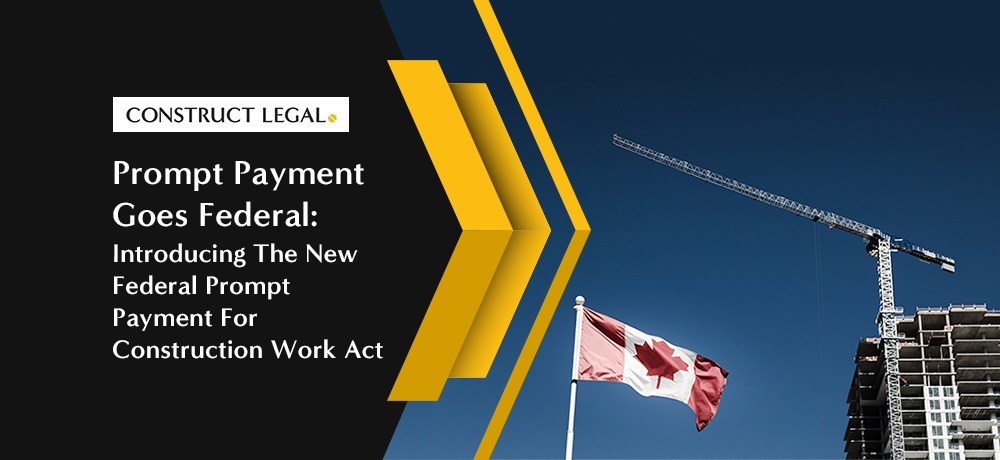Prompt Payment Goes Federal: Introducing the New Federal Prompt Payment for Construction Work Act

If you work as a contractor or subcontractor on a construction project involving the federal government of Canada, you should know that the new Federal Prompt Payment for Construction Work Act (the “Act”) may apply to you. The Act recently came into force on December 9, 2023 and offers prompt payment timelines and an adjudication procedure that previously did not exist at the federal level.
What projects does the Act apply to?
An important limitation to know is that the Act does not apply to all projects at a federal level. It only applies to projects where His Majesty the King in right of Canada (meaning, generally, the federal government) is the owner of the federal property or federal immovable that is the subject of the project. It does not apply to other projects that are in industries regulated at a federal level if the owner is not His Majesty the King in right of Canada.
Certain portions of the Act also do not apply where the project is located in a province that is a “designated province” under the Act, meaning the province already has prompt payment and adjudication legislation that is reasonably similar to the Act. Currently, the only designated provinces are Ontario, Saskatchewan, and Alberta.
There is also a one-year grace or deferral period for existing federal government construction contracts to come into compliance with the Act. This period began December 9, 2023.
What are the timelines for prompt payment?
A key feature of the Act is the prompt payment for contractors and subcontractors that perform construction work on federal government projects. Under this system, the federal government must pay a contractor within 28 days of receiving a proper invoice. The contractor will then have seven days to pay its subcontractors that were included in the proper invoice, and those subcontractors will have seven days to pay their subcontractors. The seven-day payment timelines continue at each successive level.
The federal government can refuse to pay the contractor if the government gives the contractor a notice of non-payment within 21 days of receiving a proper invoice. A contractor may decline to pay a subcontractor only if the contractor gives a notice of non-payment to the subcontractor within 28 days of the day the proper invoice was given to the owner. A subcontractor may also decline to pay a further subcontractor if the subcontractor gives a notice of non-payment to its subcontractor within 35 days of the day the proper invoice was given to the owner. These seven-day increments continue at each successive level.
There are specific requirements in the Act for notices of non-payment. Notices of non-payment must include a description of the work covered by the notice, the amount that will not be paid, and the reasons for non-payment.
How are disputes about prompt payment resolved?
The Act also introduces an adjudication procedure for disputes where a contractor or subcontractor has not been fully paid for its work within the prompt payment timelines. A contractor or subcontractor who is not paid can commence an adjudication by delivering a notice of adjudication, which must include the names of the parties to the dispute, a brief description of the dispute, the amount requested, the name of the proposed adjudicator, and any other information that may be added in the regulations.
The adjudicator must be appointed from the roster of adjudicators established by the federal Adjudicator Authority. The adjudicator will decide the dispute and will make a determination that is binding on the parties, unless they agree in writing otherwise or a court or arbitrator sets the determination aside.
If an adjudicator orders a party to make a payment, the party must pay within 10 days. If payment is not made, the successful party can file a copy of the adjudicator’s determination in court and it may be enforced as an order of the court.
Key takeaways
With the new Act, contractors and subcontractors working on federal government construction projects should have more certainty as to payment and an adjudication procedure to resolve payment disputes.
If you are a contractor, subcontractor, or supplier working on a federal government project and want to know your rights or ensure your organization is in compliance with the Act, please contact a member of Construct Legal.
The information in this article is not legal advice.